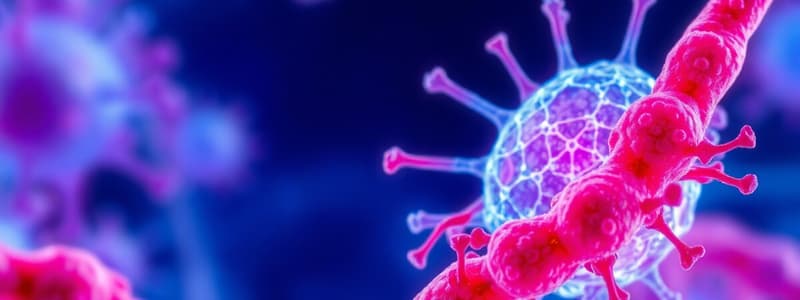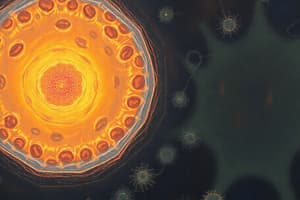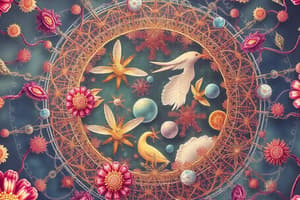Podcast
Questions and Answers
Which cellular process produces two identical daughter cells?
Which cellular process produces two identical daughter cells?
- Mitosis (correct)
- Photosynthesis
- Meiosis
- Cellular Respiration
What is the primary role of mitochondria in a cell?
What is the primary role of mitochondria in a cell?
- Producing ATP (correct)
- Digestion of waste
- Synthesizing lipids
- Storing genetic information
In which type of cell would you expect chloroplasts to be present?
In which type of cell would you expect chloroplasts to be present?
- Prokaryotic cells
- Fungal cells
- Animal cells
- Plant cells (correct)
Which organelle is primarily involved in protein synthesis?
Which organelle is primarily involved in protein synthesis?
Which type of transport requires energy to move substances against their concentration gradient?
Which type of transport requires energy to move substances against their concentration gradient?
What structural feature is absent in prokaryotic cells?
What structural feature is absent in prokaryotic cells?
What is the function of the Golgi Apparatus in a cell?
What is the function of the Golgi Apparatus in a cell?
Which process converts light energy into chemical energy?
Which process converts light energy into chemical energy?
Which of the following cellular components acts as a protective barrier and provides structural support in plant cells?
Which of the following cellular components acts as a protective barrier and provides structural support in plant cells?
What is the gel-like substance inside a cell that contains organelles?
What is the gel-like substance inside a cell that contains organelles?
Flashcards are hidden until you start studying
Study Notes
Overview of Cell Biology
- Definition: Study of cell structure, function, and behavior.
- Importance: Fundamental to understanding life processes and biological systems.
Types of Cells
-
Prokaryotic Cells:
- No nucleus or membrane-bound organelles.
- Examples: Bacteria and Archaea.
- Genetic material in a single circular chromosome.
-
Eukaryotic Cells:
- Defined nucleus and membrane-bound organelles.
- Examples: Animal cells, plant cells, fungi, and protists.
- Genetic material in linear chromosomes.
Cell Structure
-
Cell Membrane:
- Semi-permeable barrier made of phospholipids.
- Controls movement of substances in and out of the cell.
-
Cytoplasm:
- Gel-like substance within the cell membrane.
- Contains organelles and is the site for metabolic processes.
-
Nucleus:
- Contains genetic material (DNA).
- Responsible for regulating gene expression and cell division.
-
Organelles:
- Mitochondria: Powerhouse of the cell, site of ATP production.
- Ribosomes: Protein synthesis.
- Endoplasmic Reticulum (ER):
- Rough ER: Studded with ribosomes; synthesizes proteins.
- Smooth ER: Synthesizes lipids and detoxifies toxins.
- Golgi Apparatus: Modifies, sorts, and packages proteins for secretion or delivery.
- Lysosomes: Digestive enzymes for waste processing.
- Chloroplasts (in plant cells): Site of photosynthesis.
- Cell Wall (in plant cells): Provides structural support and protection.
Cellular Processes
-
Cell Division:
- Mitosis: Division of somatic cells, producing two identical daughter cells.
- Meiosis: Division for gamete production, resulting in four genetically diverse cells.
-
Cellular Respiration:
- Process of converting glucose into ATP.
- Aerobic respiration involves oxygen; anaerobic does not.
-
Photosynthesis (in plants):
- Process of converting light energy into chemical energy (glucose).
- Occurs in chloroplasts, using sunlight, water, and CO2.
Membrane Transport
-
Passive Transport:
- Movement of substances without energy input.
- Examples: Diffusion, osmosis, facilitated diffusion.
-
Active Transport:
- Movement of substances against their concentration gradient.
- Requires energy (ATP).
- Example: Sodium-potassium pump.
Cell Communication
- Signaling Molecules: Hormones, neurotransmitters, and other chemicals that facilitate communication between cells.
- Receptors: Proteins on cell membranes that bind to signaling molecules, triggering a response.
Cell Cycle Regulation
- Controlled by checkpoints; ensures proper division and function.
- Key proteins: Cyclins and cyclin-dependent kinases (CDKs).
Specialization and Differentiation
- Cells can differentiate to perform specific functions (e.g., muscle, nerve, epithelial cells).
- Stem cells have the potential to develop into various cell types.
Techniques in Cell Biology
- Microscopy: Techniques like light microscopy and electron microscopy for imaging cells.
- Cell Culture: Growing cells in controlled environments for observation and experimentation.
Overview of Cell Biology
- Study of cell structure, function, and behavior; essential for understanding life processes and biological systems.
Types of Cells
- Prokaryotic Cells: Lack nucleus and membrane-bound organelles; includes bacteria and archaea; genetic material is a single circular chromosome.
- Eukaryotic Cells: Possess defined nucleus and membrane-bound organelles; includes animal cells, plant cells, fungi, and protists; genetic material is organized into linear chromosomes.
Cell Structure
- Cell Membrane: Semi-permeable phospholipid barrier; regulates substance movement in and out of the cell.
- Cytoplasm: Gel-like substance within the cell; contains organelles and is the site of metabolic activities.
- Nucleus: Houses genetic material (DNA); controls gene expression and cell division.
- Organelles:
- Mitochondria: Known as the cell's powerhouse; location of ATP production.
- Ribosomes: Sites for protein synthesis.
- Endoplasmic Reticulum (ER):
- Rough ER: Contains ribosomes for protein synthesis.
- Smooth ER: Involved in lipid synthesis and toxin detoxification.
- Golgi Apparatus: Modifies, sorts, and packages proteins for transport.
- Lysosomes: Contain digestive enzymes for waste processing.
- Chloroplasts (in plant cells): Sites for photosynthesis.
- Cell Wall (in plant cells): Provides structural support and protection.
Cellular Processes
- Cell Division:
- Mitosis: Produces two identical daughter cells from somatic cells.
- Meiosis: Produces four genetically diverse gametes.
- Cellular Respiration: Converts glucose into ATP; characterized by aerobic processes (using oxygen) and anaerobic processes (without oxygen).
- Photosynthesis (in plants): Converts light energy to chemical energy (glucose) using sunlight, water, and carbon dioxide.
Membrane Transport
- Passive Transport: Movement of substances without energy; includes diffusion, osmosis, and facilitated diffusion.
- Active Transport: Movement against concentration gradient; requires ATP; exemplified by the sodium-potassium pump.
Cell Communication
- Signaling Molecules: Include hormones and neurotransmitters that enable cell communication.
- Receptors: Membrane proteins that bind signaling molecules, initiating a cellular response.
Cell Cycle Regulation
- Regulated by checkpoints that ensure accurate division and cellular function; key proteins involved are cyclins and cyclin-dependent kinases (CDKs).
Specialization and Differentiation
- Cells can differentiate to perform specific roles (e.g., muscle, nerve, epithelial); stem cells can develop into various cell types.
Techniques in Cell Biology
- Microscopy: Employs light microscopy and electron microscopy for cell imaging.
- Cell Culture: Involves growing cells in controlled settings for research and experimentation.
Studying That Suits You
Use AI to generate personalized quizzes and flashcards to suit your learning preferences.




